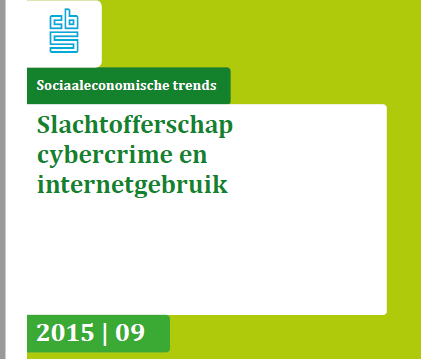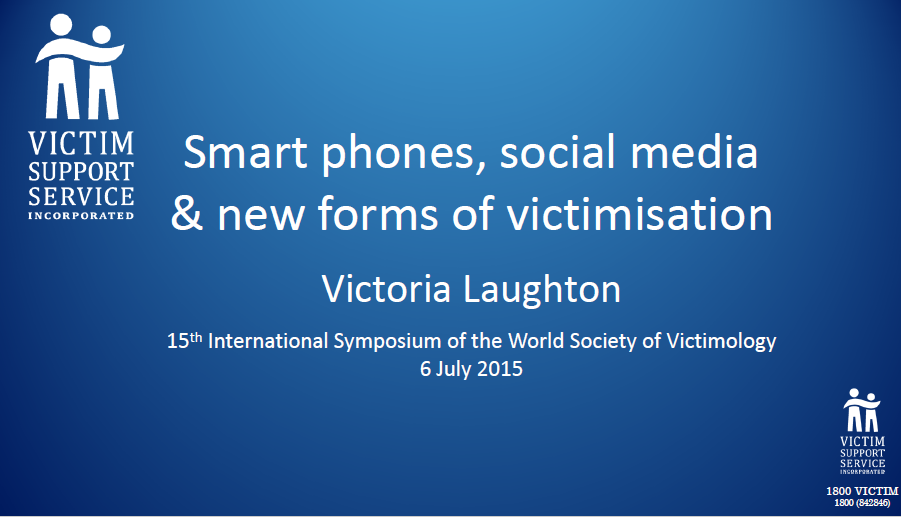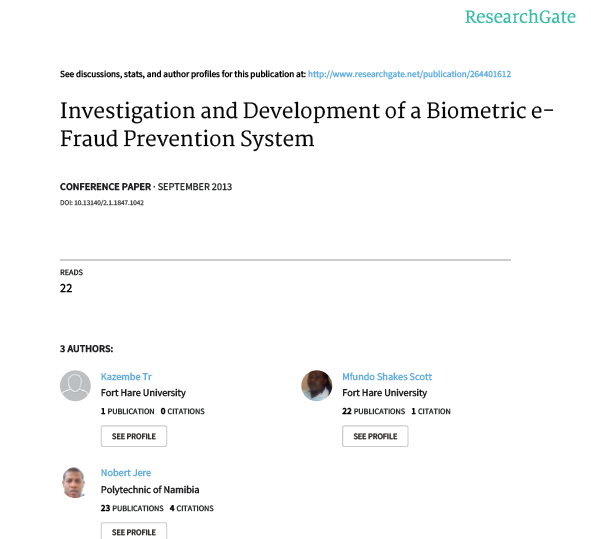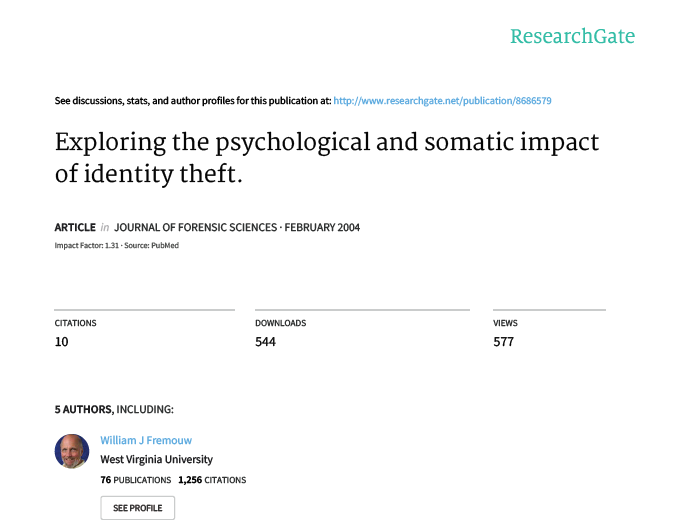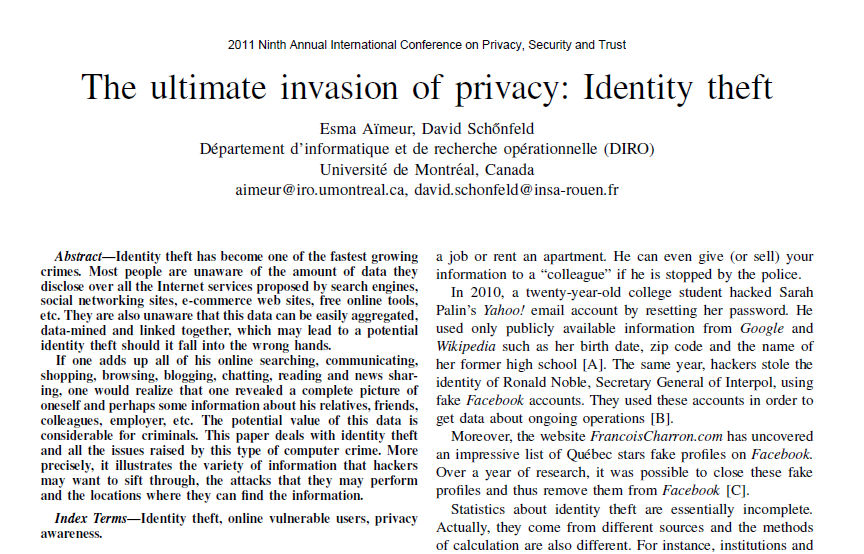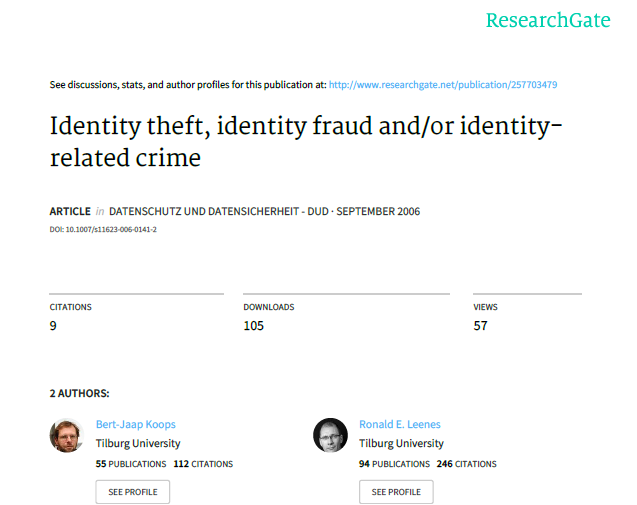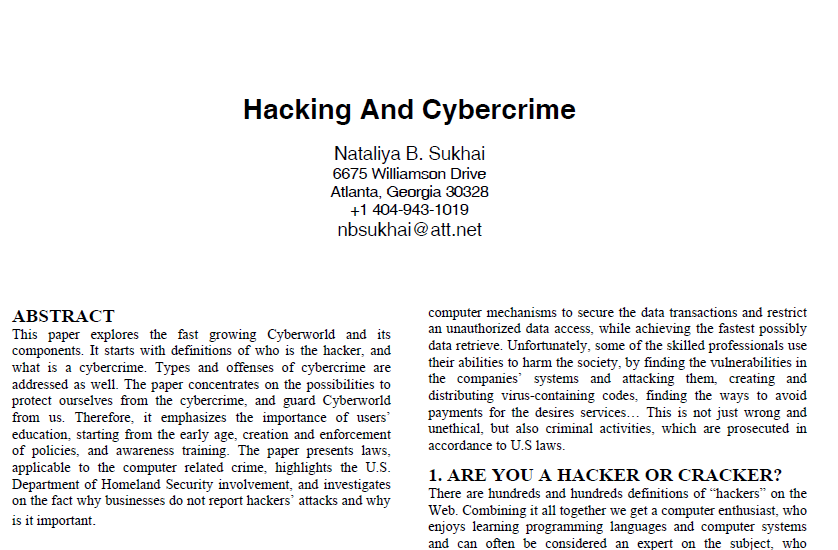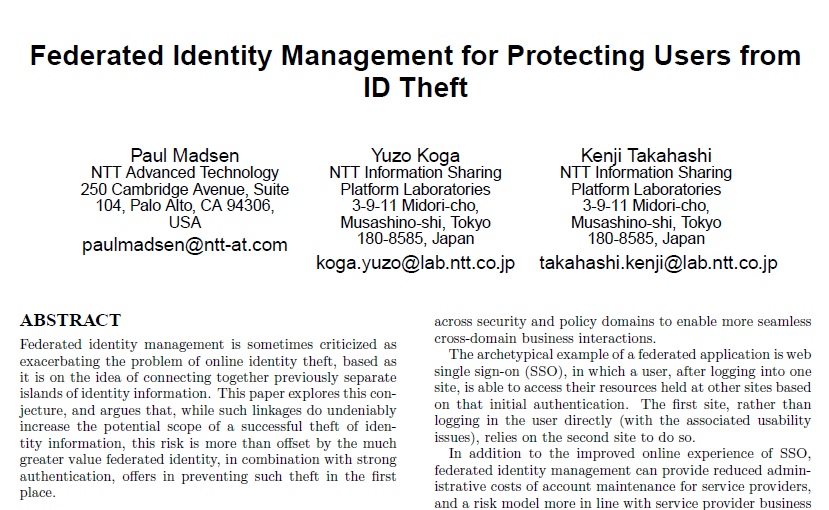For a quick search in the Knowledge database below, please use the search box. Also, note that using one or more of the dropdown filters will optimise your search.
Watch this video to find out more about our Knowledge Database and the publications we have collected here for you: video
Knowledge Database
-
Slachtofferschap cybercrime en internetgebruik
Rianne Kloosterman | Published in 2015
Keywords: victimisation -
Smart phones, social media & new forms of victimisation
Victoria Laughton | Published in 2015
Keywords: cybercrime, fraud, victimisation -
Investigation and Development of a Biometric e-Fraud Prevention System
Kazembe T.R., Scott M.S. and Jere N.R. | Published in 2013
Online Fraud remains a single colossal form of modern day crime with trickery ploys that seem to increase at a pace faster than technology is changing. No doubt online fraud is the cause of concern not only in developing countries but the world at large. Relying only on User ID and User Password as well as case based online Fraud analytics adapters is neither practical nor efficient at stopping the stealing of user name and password. The work paper explores biometrics as a better option to introduce Fraud prevention efforts. It is the prelude to the development of an online fraud prevention framework targeted at improving the plight of marginalised communities specifically Dwesa in the Eastern Cape province of South Africa This is a rural location in which our research team has an ICT infrastructure deployed and villagers from this community make use of such a facility for their various daily operations.
Keywords: fraud -
Exploring the psychological and somatic impact of identity theft
Tracy Sharp, Andrea Shreve-Neiger, William Fremouw, John Kane and Shawn Hutton | Published in 2004
Identity theft is a new and growing form of white-collar crime. This exploratory study examined the psychological and somatic impact of identity theft and coping methods utilized by victims. Thirty-seven victims of identity theft participated in regional victim focus groups. Participants completed a victim impact questionnaire designed by the authors and the Brief Symptom Inventory–18 (BSI–18). The majority of participants expressed an increase in maladaptive psychological and somatic symptoms post victimization. Results on the BSI indicated that identity theft victims with unresolved cases, in contrast to those with resolved cases, were more likely to have clinically elevated scores when compared with a normative sample. Relatively similar coping mechanisms were utilized across victims. The results from this study suggest that victims of identity theft do have increased psychological and physical distress, and for those whose cases remain unresolved, distress is maintained over time.
Keywords: fraud, mental health, victimisation -
Identity Theft Literature Review
Graeme R. Newman, Megan M. McNally | Published in 2005
-
The ultimate invasion of privacy: Identity theft
Esma Aimeur, David Schonfeld | Published in 2011
Identity theft has become one of the fastest growing crimes. Most people are unaware of the amount of data they disclose over all the Internet services proposed by search engines, social networking sites, e-commerce web sites, free online tools, etc. They are also unaware that this data can be easily aggregated, data-mined and linked together, which may lead to a potential identity theft should it fall into the wrong hands. If one adds up all of his online searching, communicating, shopping, browsing, blogging, chatting, reading and news sharing, one would realize that one revealed a complete picture of oneself and perhaps some information about his relatives, friends, colleagues, employer, etc. The potential value of this data is considerable for criminals. This paper deals with identity theft and all the issues raised by this type of computer crime. More precisely, it illustrates the variety of information that hackers may want to sift through, the attacks that they may perform and the locations where they can find the information.
-
Identity Theft, Privacy, and the Architecture of Vulnerability
Daniel J. Solove | Published in 2003
Keywords: fraud -
Identity theft, identity fraud and/or identity-related crime
Bert-Jaap Koops, Ronald Leenes | Published in 2006
Identity theft is often perceived as one of the major upcoming threats in crime. However, there is no commonly accepted definition of 'identity theft' or 'identity fraud', and it is impossible to study the real threat of this phenomenon without conceptual clarity. In this article, we attempt to provide a starting point for policy and research by proposing some definitions. We indicate that what is usually called 'identity theft' (defined as fraud or another unlawful activity where the identity of an existing person is used as a target or principal tool without the person's consent) is part of the larger issue of 'identity fraud'. This, in turn, is a subject of the umbrella-term 'identity-related crime', which we define as all punishable activities that have identity as a target or a principal tool. We argue that it is relevant to look at this broader picture, since not only identity 'theft', but also consensual yet unlawful identity changes as well as unlawful identity deletion should receive the attention of policy-makers and legislatures.
Keywords: fraud -
Hacking and Cybercrime
This paper explores the fast growing Cyberworld and its components. It starts with definitions of who is the hacker, and what is a cybercrime. Types and offenses of cybercrime are addressed as well, The paper concentrates on the possibilities to protect ourselves from the cybercrime, and guard Cyberworld from us. Therefore, it emphasizes the importance of users' education, starting from the early age, creation and enforcement of policies, and awareness training. The paper presents laws, applicable to the computer related crime, highlights the U.S. Department of Homeland Security involvement, and investigates on the fact why businesses do not report hackers' attacks and why it is important.
Keywords: fraud, prevention -
Federated Identity Management for Protecting Users from ID Theft
Paul Madsen, Yuzo Koga, Kenji Takahashi | Published in 2005
Federated identity management is sometimes critisized as exacerbating the problem of online identity theft, based as it is on the idea of connecting together previously separate islands of identity information. This paper explores this conjecture, and argues that, while such linkages do undeniably increase the potential scope of a successful theft of identity information, this risk is more than offset by the much greater value federated identity, in combination with strong authentication, offers in preventing such theft in the first place.
Keywords: fraud
